Olympic Swimmer Yusra Mardini on Returning to Syria After a Decade Away

When her home was destroyed in the Syrian civil war, Yusra Mardini and her family fled, eventually resettling in Germany. During one leg of their journey, a small boat they were traveling on from Lebanon stopped working and Mardini and her sister—both competitive swimmers since they were children—jumped into the water and towed it for more than three hours to make it to Lesbos, Greece. Netflix’s 2022 film The Swimmers famously told the story of how the sisters went from Syria to competing at the 2016 and 2020 Summer Olympics as part of the Refugee Olympic Team. They once wondered if they’d never return to Syria.
But this past December, the country’s brutal Assad regime was toppled by rebel forces after 50 years, and while there is still conflict and many safety risks remain, some Syrians feel ready to return now that the violent dictatorship has ended. Over 13 million Syrians have been displaced in the past 14 years. Since December 8, around 370,000 refugees have returned home to their communities. Many more hope to do the same. In March, Mardini became one of them.
Ten years after she left, Mardini returned to Syria, along with her mother. They visited their relatives, saw the remains of their home, and visited with displaced people as part of Mardini’s role as a Goodwill Ambassador for the United Nations High Commissioner for Refugees.
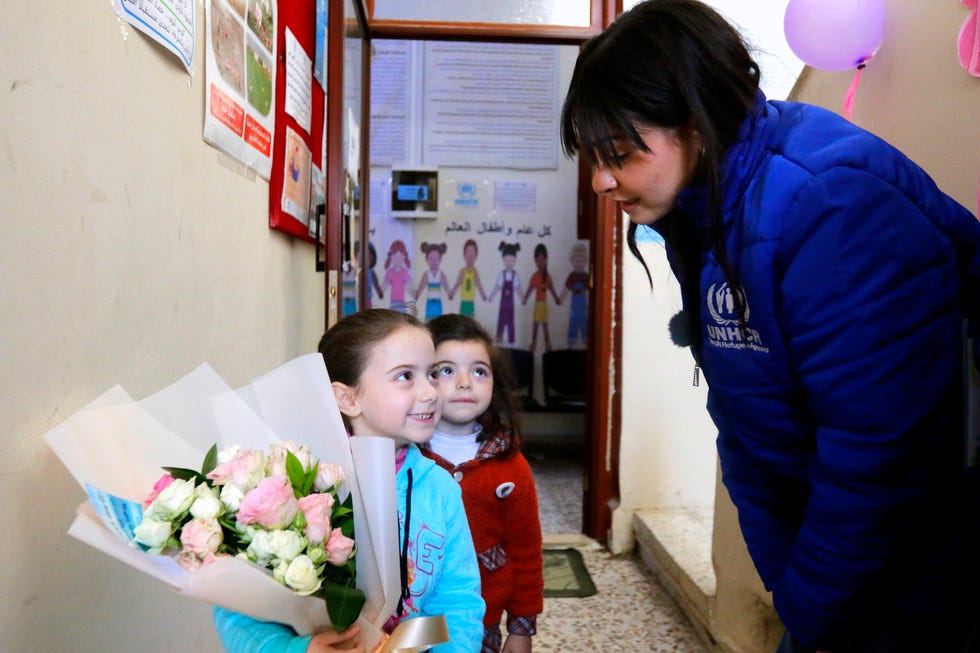
During her visit, Mardini saw the nation reeling from the ongoing war and the implications of sanctions that the U.S. and other countries have put on Syria. According to UNICEF, more than two million school-aged children are out of school there, and one in three schools cannot be used because they were either destroyed, or damaged, or are being used as shelter.
“The most important thing for people to know about Syria is that this country is in a state of pain. There’s a lot of anger. There’s a lot of asking, ‘Why did the world turn their backs on us?’” she says. “Syria needs to heal. Syria needs to be protected. We need to build the country with the values that we were taught when we were young. We need to protect each other as Syrians. I want people to understand that the most important thing for Syrians right now is basic human rights. We need those.”
What was it like to go home to Syria after such a long time away?It was a mix of emotions. The moment we crossed the border, I was in tears. It made it so much more emotional to have my mother next to me in the car, seeing my grandma after 10 years, seeing my family. It was as if nothing changed, but everything did change. It was like, this is my home, this is my land, but I’m kind of a stranger.
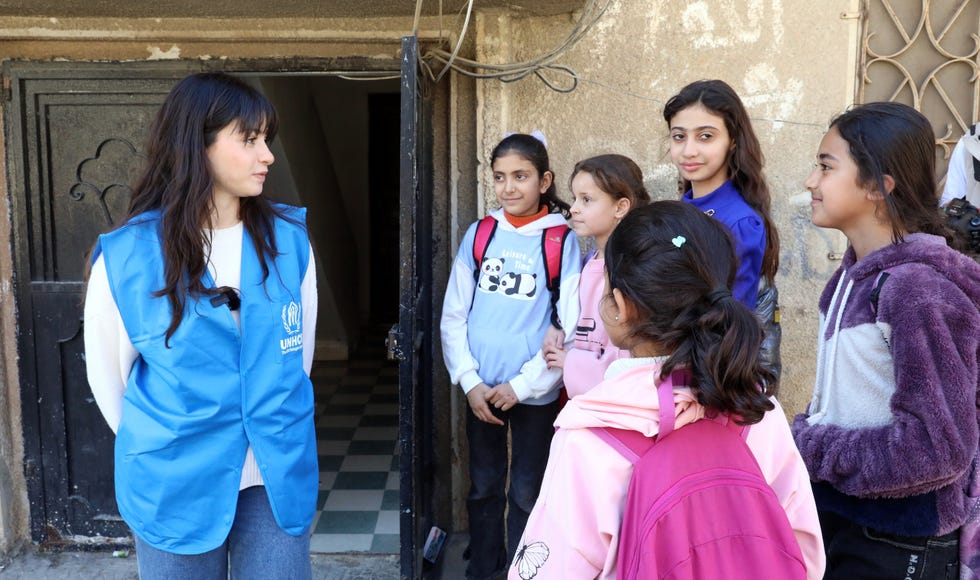
Mardini meets with children in Syria.
My friends took me around and told me about the new places, and about how heavy the sanctions are. It’s my country—I felt a little bit disappointed that I didn’t know how much they were struggling, even though I’m an advocate, and even though I’ve been talking about my country for the past 10 years.
When I came back from Syria, it was very heavy on me. When I was 17, it was a bit easier. I had swimming to focus my anger at, and I could channel everything into something positive, into my goals. Now I’m 27, and I feel like we get attached a little deeper. We get sad a bit more. We can’t move on as quickly as we could when we were young. It was like a brand-new experience that I have to still process.
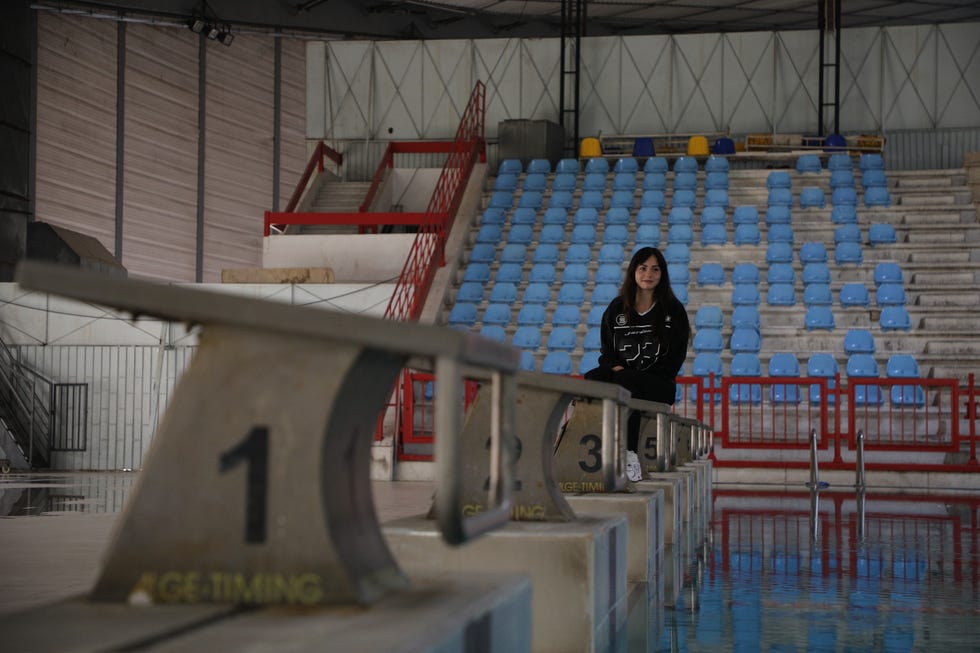
Mardini at the pool she once swam in.
Syrians are so isolated from the world. The regime and the sanctions have made it very difficult for people to have a normal life. They are living to survive. Of course, they have their goals and their ambitions, and they wake up every day with a positive attitude, trying to accomplish things in life. What I noticed is the urgent need for everything. When I say everything, everything. Forty percent of schools in Syria are destroyed; 90 percent of Syrians are on the poverty line. It’s still the highest number for refugee crisis in the world—13 million. It’s so heartbreaking.
“How can I use my anger to actually make a difference?”
Even if you did not seek refuge outside of Syria, you are displaced within the country. A lot of people go back and find their homes destroyed. It’s just, in general, very heartbreaking. I always say that I came back with so much anger and sadness, but I’ll channel that to do good. I want to be angry at the world. I’m not going to lie to you. I want to scream, but I can actually take that anger and put it into something good. Instead of just words, I can actually think, how can I navigate building schools, building hospitals, working with UNHCR, visiting shelters? How can I use my anger to actually make a difference? That’s not easy, but the difference is a lot.
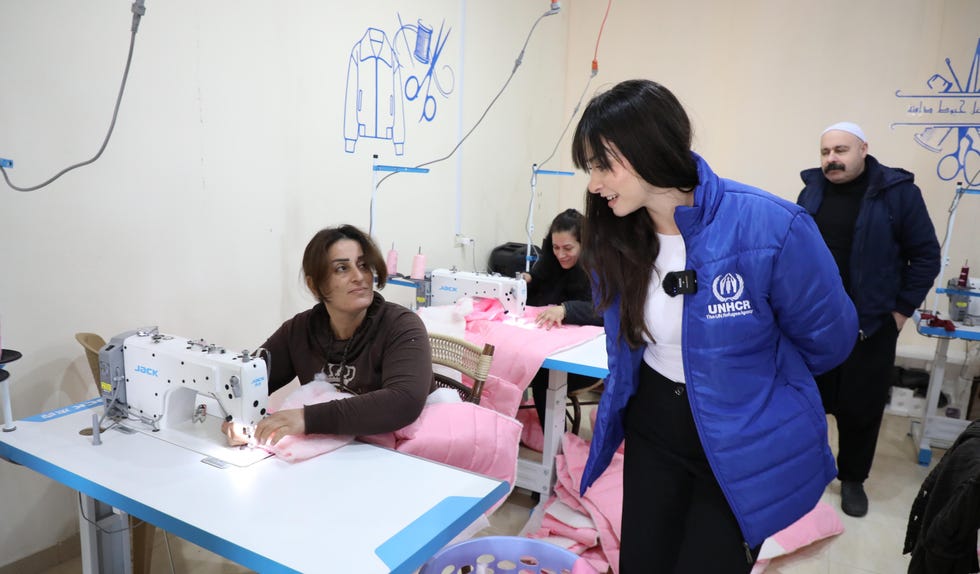
Mardini visited the “Warm Threads Workshop,” a sewing workshop that mainly produces winter jackets for children and employs 25 women, including internally displaced people, returnees, and community members.
Oh, it was not the right time. There’s no right time. But I wanted to go back in December—I was not going to wait. I didn’t care about security. I didn’t care about anything. I am very lucky to have UNHCR. I’m very lucky to have my mother tell me, ”You need to wait. You need to be patient.” It was the right timing because UNHCR is an incredible team that said, “Okay, we’ll navigate this trip because it’s very, very important,” even though they’re [dealing with] insane budget cuts right now. Not many missions are happening right now, but they understood the importance of me going back home and helping my people.
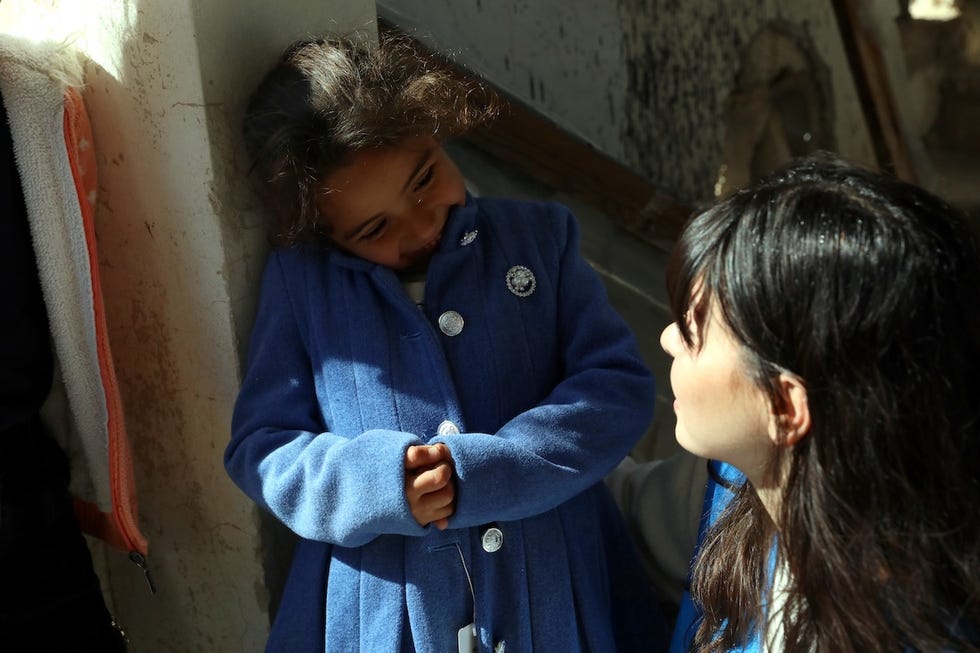
Mardini with Kholoud.
I met with a lot of people, actually. I met with the staff from UNHCR in Damascus. We went to a few community centers in Daraa and Homs, and we went to businesses that are supported by UNHCR. It was honestly very inspiring to me to meet the people and understand that, for small businesses, it’s just like they’re starting from scratch.
They’re already displaced, and they are learning how to give back from nothing. They’re giving job opportunities to other refugees or other Syrians. They are teaching them how to knit or how to make this product. These women that are employed are supporting their families. It was very inspiring, but I wasn’t surprised because I know my people. My grandma would not throw out an old shirt. She would create something out of it. I love that about Syrians.
There was one family that we visited, and I met this little girl named Kholoud, wearing her new clothes from aid. Her house was destroyed, but she had the biggest smile on her face. She was so excited. For me, I was like, This is why I do the work that I do, because I want to be someone that inspires her. I want her to look up at me and say, “Look, Yusra made it. So can I.”
“My grandma would not throw out an old shirt. She would create something out of it. I love that about Syrians.”
Is it heartbreaking? Do I want to take them all and put them in a better location, give them all the rights that they’re supposed to have? One hundred percent. I wish I was a superwoman, but I’m not. This is not the only trip that I’m going to make to Syria. My goal is to be someone that is able to build schools, to build hospitals, to be able to support refugees worldwide, not just in Syria. I truly believe I can.
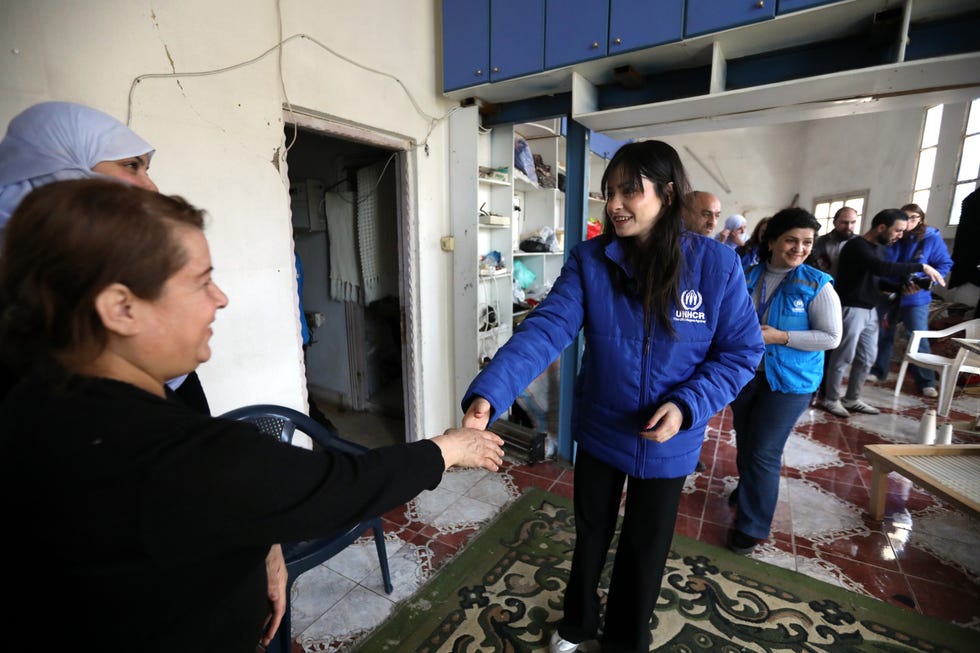
It’s still heavy. I expected it to be destroyed, but not completely on the ground. [But it was.] I don’t know what happened. The neighbors told us that the building stood until seven months ago, so maybe it was dangerous to keep it standing? I have no idea what happened. My mom was like, “This is the building.” I was like, “No.” She was like, “We just saw your uncle’s house. This is our building.” I was like, “No.” It was really, really devastating.
I shared the video online because I know that I have a responsibility. I know that I have the power, and I know that my voice would reach people. It’s gotten 21 million views right now.
A lot of people are commenting on things that I fought for: “Oh, but her nails are pretty, her hair is pretty, her outfit is fine. What is she crying about?” We put refugees in a box—we have to look a certain way, we have to speak a certain way. How dare we speak English, and how could we look pretty and clean? But I knew that very few people can share a video like that. Who wants to stand in front of their destroyed home and show the world? I don’t think anyone wants that.
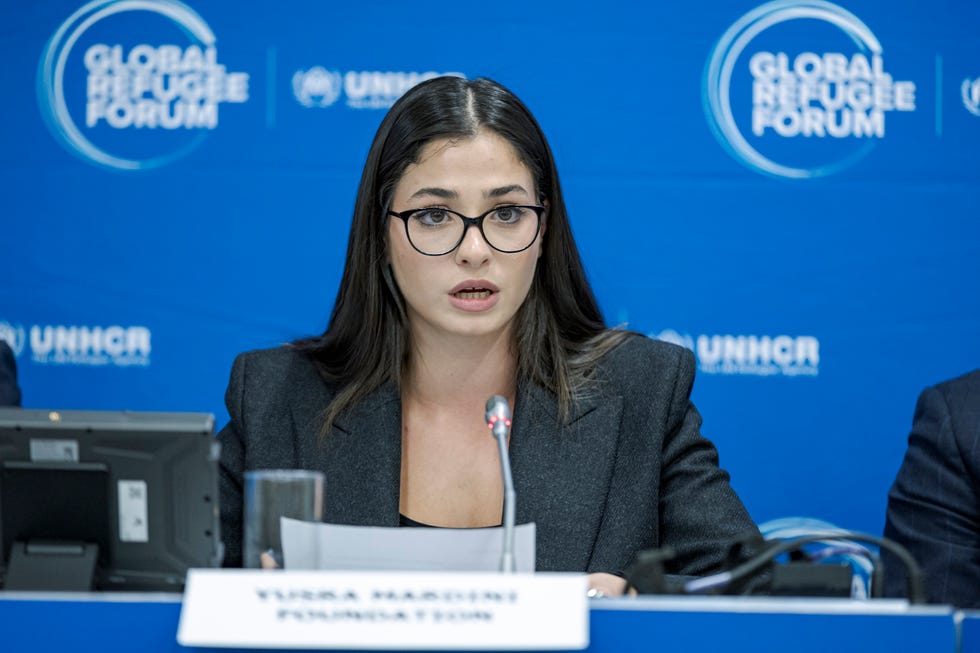
Mardini speaking at the UNHCR’s Global Refugee Forum.
Swimming taught me a lot. From a very young age, I learned how to separate between my professional life and my personal life. My father always told me, “When you’re in the pool, you’re focusing on your goals, and everything else outside of the pool can wait.” It taught me how to do that in life, with or without sports.
Swimming also taught me patience. I am not going to get to where I want by doing ordinary things, but I have to do ordinary things for a very long time in order to do extraordinary things. I have to do boring workouts. I have to do boring hours in the pool for me to get to the level that I want. It taught me how to deal with disappointment, and it taught me how to try again.
This interview has been edited and condensed for clarity.
elle





